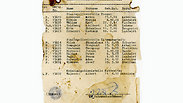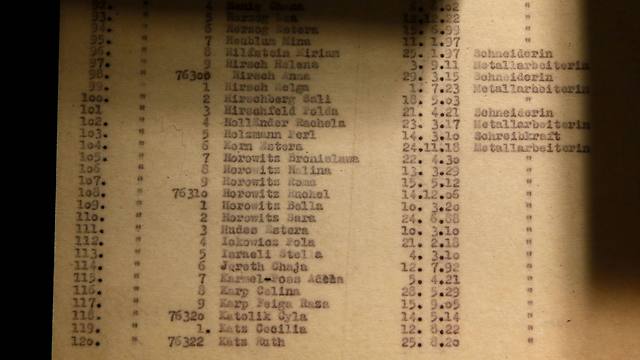

Heir to Schindler's widow sues Yad Vashem
After the discovery and transfer of a suitcase of documents belonging to Oscar Schindler in the 1990s, Emily Schindler's heir is filing suit for ownership of the materials, currently in possession of Yad Vashem; Judge rules that her German inheritance claim is not valid in Israel.
Schindler and his wife Emily were recognized as Righteous Among the Nations after saving 1,200 Jews during World War II. Following the war, the Schindlers went to Argentina where they eventually separated. Ultimately, Oscar moved back to Germany, while Emily stayed in Buenos Aires, where she became friends with Prof. Marta Erika Rosenberg, who eventually inherited Emily's estate when she died in 2001.
The suit Rosenberg filed revolves around the suitcase and the documents within it, which was discovered in the 1990s by the children of one of Schindler's late lovers, Ann Staehr. The children gave the documents to German newspaper Stuttgarter Zeitung, which published them in 1999.
Following the publication, Emily Schindler demanded the suitcase, but the newspaper was quick to "smuggle" it to Israel and transfer it to Yad Vashem.
In the suit filed by Rosenberg three years ago, she demands the suitcase and the documents from Yad Vashem, which according to her, were brought to Israel illegally. She is relying on a German succession of inheritance order which recognizes her as the sole heir of Emily Schindler. Furthermore, she is requesting that the Israeli court recognize such an order so that it may be enforced in Israel.
Yad Vashem administrators asked that Rosenberg's request be denied legally and the German succession of inheritance order not be recognized in Israel. The museum contends that the acquisition of the suitcase and documents is irrelevant and the burden is on Rosenberg to prove that Emily Schindler is the only heir to Oscar Schindler's estate, given that they broke up and he had other children.
In response, Rosenberg has argued that any supposed heirs were born before the adoption of a German law that recognizes the rights of claimants born outside of wedlock. Furthermore, it is unclear if such heirs are even alive or interested in participating in the proceedings.
Judge Daniel Teferberg agreed with Yad Vashem that in Israel today, it is impossible to ignore the rights of children born outside of marriage due to the timing of inheritance laws in Germany. Furthermore, Teferberg ruled that Rosenberg did not prove that Emily Schindler was the owner of the suitcase and documents, and as such, the dispute regarding ownership is not resolved.
Even if one could assume that the plaintiff is entitled to inherit the property, the judge added, she failed to prove that the inheritance order meets the conditions of a foreign judgment in accordance with Israeli law. Therefore, the judge ruled that in order for the suit to continue, Rosenberg must file a public Israeli ownership claim, which would allow other children of Oscar Schindler to put forward a case for ownership.
















